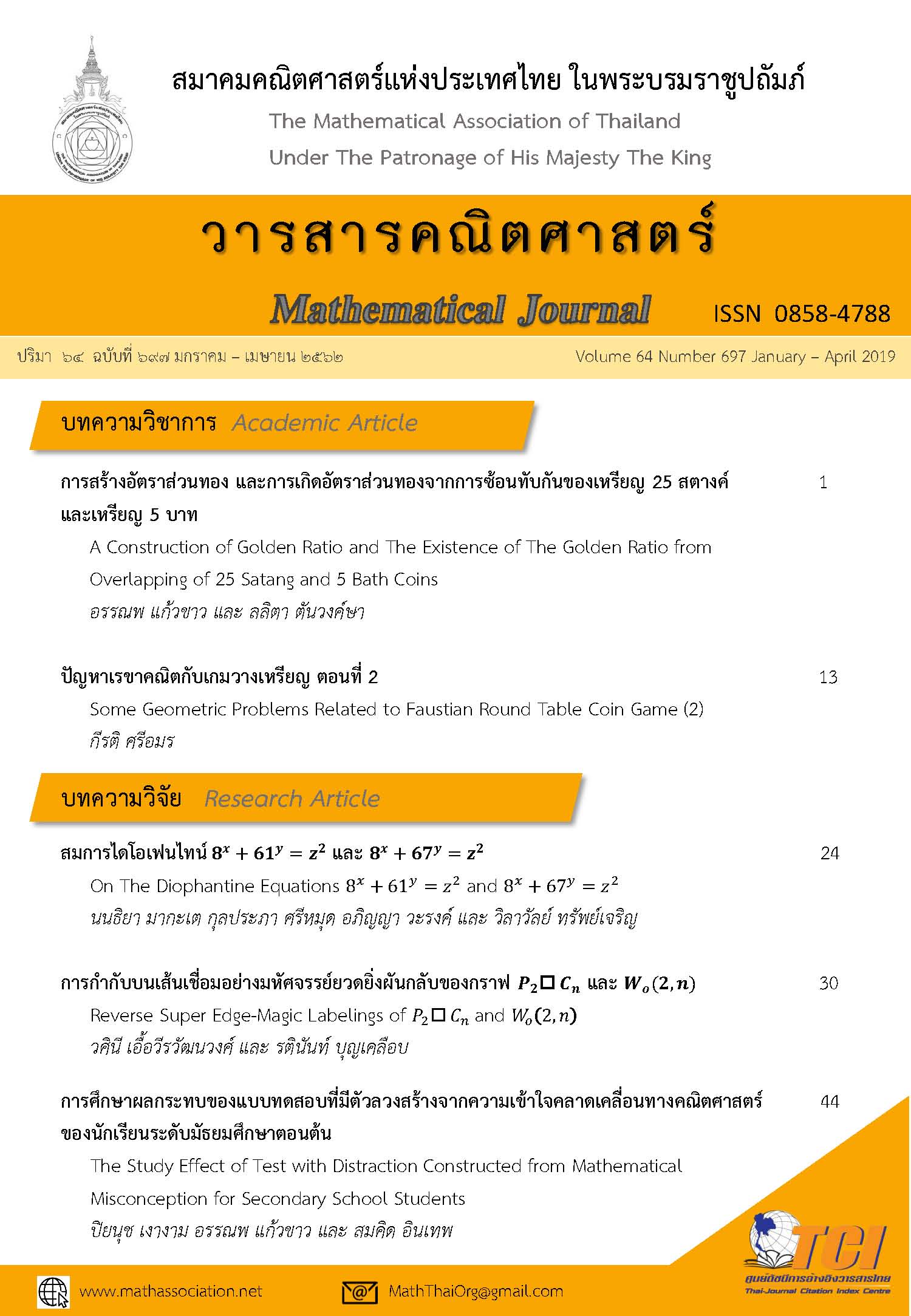On The Diophantine Equation 8^x + 61^y = z^2 and 8^x + 67^y = z^2
Main Article Content
Abstract
In this paper, we study solutions (x, y, z) where x, y and z are non - negative integers of Diophantine equations and
. We find that both of them have a unique solution, that is (x, y, z) = (1, 0, 3).
Article Details
How to Cite
Makate, N. (2019). On The Diophantine Equation 8^x + 61^y = z^2 and 8^x + 67^y = z^2. Mathematical Journal by The Mathematical Association of Thailand Under The Patronage of His Majesty The King, 64(697), 24–29. retrieved from https://ph02.tci-thaijo.org/index.php/MJMATh/article/view/174756
Section
Research Article
References
[1] Chotchaisthit, S. (2012). On the Diophantine Equation 4^x + p^y = z^2 where p is a Prime Number. American Journal of Mathematics and Sciences, 1 (1), p. 191 - 193.
[2] Khan, Md. A. A., Rashid, A. and Uddin, Md. S. (2016). Non-Negative Integer Solutions of Two Diophantine Equations 2^x + 9^y = z^2 and 5^x + 9^y = z^2. Journal of Applied Mathematics and Physics, 4 (4), p. 762 - 765.
[3] Mihailescu, P. (2004). Primary Cyclotomic Units and a Proof of Catalan’s Conjecture. Journal fur die Reine und Angewandte Mathematik, 27, p. 167 - 195.
[4] Sroysang, B. (2012). More on the Diophantine Equation 8^x + 19^y = z^2. International Journal of Pure and Applied Mathematics, 81 (4), p. 601 - 604.
[5] Sroysang, B. (2013). More on the Diophantine Equation 2^x + 3^y = z^2. International Journal of Pure and Applied Mathematics, 84 (2), p. 133 - 137.
[6] Sroysang, B. (2014). More on the Diophantine Equation 8^x + 59^y = z^2. International Journal of Pure and Applied Mathematics, 91 (1), p. 139 - 142.
[7] Sroysang, B. (2013). On the Diophantine Equation 7^x + 8^y = z^2. International Journal of Pure and Applied Mathematics, 84 (1), p. 111 - 114.
[8] Sroysang, B. (2014). On the Diophantine Equation 8^x +13^y = z^2. International Journal of Pure and Applied Mathematics, 90 (1), p. 69 - 72.
[9] Suvarnamani, A. (2011). Solutions of the Diophantine Equation 2^x + p^y = z^2. International Journal of Mathematical Sciences and Applications, 1 (3), p. 1415-1419.
[2] Khan, Md. A. A., Rashid, A. and Uddin, Md. S. (2016). Non-Negative Integer Solutions of Two Diophantine Equations 2^x + 9^y = z^2 and 5^x + 9^y = z^2. Journal of Applied Mathematics and Physics, 4 (4), p. 762 - 765.
[3] Mihailescu, P. (2004). Primary Cyclotomic Units and a Proof of Catalan’s Conjecture. Journal fur die Reine und Angewandte Mathematik, 27, p. 167 - 195.
[4] Sroysang, B. (2012). More on the Diophantine Equation 8^x + 19^y = z^2. International Journal of Pure and Applied Mathematics, 81 (4), p. 601 - 604.
[5] Sroysang, B. (2013). More on the Diophantine Equation 2^x + 3^y = z^2. International Journal of Pure and Applied Mathematics, 84 (2), p. 133 - 137.
[6] Sroysang, B. (2014). More on the Diophantine Equation 8^x + 59^y = z^2. International Journal of Pure and Applied Mathematics, 91 (1), p. 139 - 142.
[7] Sroysang, B. (2013). On the Diophantine Equation 7^x + 8^y = z^2. International Journal of Pure and Applied Mathematics, 84 (1), p. 111 - 114.
[8] Sroysang, B. (2014). On the Diophantine Equation 8^x +13^y = z^2. International Journal of Pure and Applied Mathematics, 90 (1), p. 69 - 72.
[9] Suvarnamani, A. (2011). Solutions of the Diophantine Equation 2^x + p^y = z^2. International Journal of Mathematical Sciences and Applications, 1 (3), p. 1415-1419.


